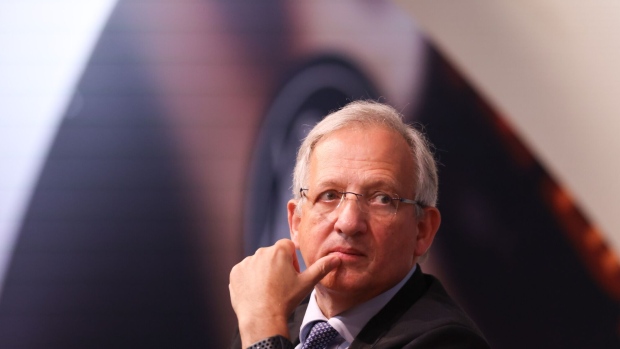Market News
Bank of England Official Says UK Likely to Need Digital Pound - BLOOMBERG
, Bloomberg News

Jon Cunliffe, deputy governor for financial stability at the Bank of England (BOE), during a financial stability report news conference at the central bank's headquarters in the City of London, UK, on Wednesday, July 12, 2023. The Bank of England said the UK’s eight largest lenders all passed its latest stress test, which examined their resilience to a severe economic downturn. Photographer: Hollie Adams/Bloomberg , Bloomberg
(Bloomberg) -- Bank of England Deputy Governor Jon Cunliffe said the UK will probably need to produce a digital version of the pound in the coming years to maintain its involvement in the money people use every day.
In his last speech before finishing his term at the central bank, Cunliffe said no decisions have been made yet about whether to go ahead with a central bank digital currency, or CBDC, which newspapers have called “Britcoin.”
“On current trends, the Digital Pound in the form we have proposed is likely to be needed by the end of the decade,” Cunliffe said in the text of a speech delivered at a US Federal Reserve conference on Thursday. “The picture may look very different in two to three years’ time when a decision is due to be taken.”
He didn’t mention inflation or interest rates in the text, sticking to issues related to payment systems. Cunliffe finishes his term before the BOE’s next rates decision on Nov. 2. The BOE and Treasury are analyzing 50,000 responses to their consultation about a CBDC.
The BOE is at the forefront of efforts by central banks around the world to consider digital forms of currency as more transactions online move to credit and debit cards, leaving fewer people carrying or using cash.
That trend would leave the control of money in the hands of some 800 private companies unless central banks come up with a government-backed alternative form of payment — a digital version of the pound.
“The only form of state money available to the public at present – physical cash – is declining in use and usability,” Cunliffe said. “My view is that it is likely to be necessary to issue central bank money in digital form to support confidence in money, particularly in stress, and to ensure the singleness of money.”
Cunliffe said a digital pound would involve private companies. The BOE would provide the central infrastructure, including the core ledger to keep track of who holds the currency. Private firms would provide the interface between the BOE’s infrastructure and users by offering wallets and payment services.
“We do not want to prevent such innovation, provided – and this is a very, very important ‘provided’ – the risks can be managed,” he said.









